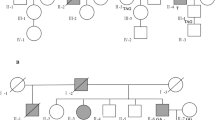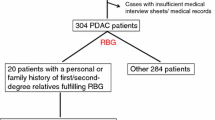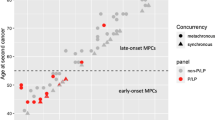Abstract
Lynch syndrome is an inherited cancer syndrome caused by germline mutations in mismatch repair (MMR) genes MLH1, MSH2, MSH6 and PMS2. LS predisposes to high risk of early-onset colorectal, endometrial and other tumors. Patients with Lynch syndrome have also been shown to have an elevated risk for pancreatic cancer (PC). In this study, we aimed to estimate the frequency of suspected Lynch syndrome among a series of 135 PC patients. Further, we wanted to determine the frequency of MMR gene mutations in the suspected Lynch syndrome cases. We also aimed to verify the pathogenicity of any novel non-truncating variants we might detect with a functional assay. Based on personal and/or familial cancer history, 19 patients were classified as suspected Lynch syndrome cases. DNA material for mutation analysis was available for eleven of them. Four patients were found to carry a total of five MLH1 or MSH2 variants. Of these, MSH2-Q402X, MSH2-G322D, and MLH1-K618A had been previously reported, while the MSH2-E205Q and MSH2-V367I variants were novel. MSH2-Q402X is a known stop mutation and reported here for the first time here in association with PC. MLH1-K618A was found in the unaffected branch of a kindred, suggesting that it may be a polymorphism or a low penetrance variant. MSH2-G322D likely does not cause a MMR defect, although this variant has also been associated with breast cancer as indeed seen in our patient. The novel variants MSH2-E205Q and MSH2-V367I were found in the same patient. Both novel variants were however functional in the applied MMR assay. Our findings suggest that only a small subset of pancreatic cancer patients carry pathogenic MMR mutations.


Similar content being viewed by others
Abbreviations
- PC:
-
Pancreatic cancer (pancreatic adenocarcinoma)
- s-LS:
-
Suspected-Lynch syndrome
References
Brand RE, Lynch HT (2006) Genotype/phenotype of familial pancreatic cancer. Endocrinol Metab Clin North Am 35(2):405–415
Habbe N, Langer P, Sina-Frey M, Bartsch DK (2006) Familial pancreatic cancer syndromes. Endocrinol Metab Clin North Am 35(2):417–430
Lynch HT, de la Chapelle A (2003) Hereditary colorectal cancer. N Engl J Med 348:919–932
Vasen HF, Watson P, Mecklin J, Lynch HT (1999) New clinical criteria for hereditary nonpolyposis colorectal cancer (HNPCC, Lynch syndrome) proposed by the International Collaborative group on HNPCC. Gastroenterology 116:1453–1456
Umar A, Boland CR, Terdiman JP, Syngal S, de la Chapelle A, Rüschoff J, Fishel R, Lindor NM, Burgart LJ, Hamelin R, Hamilton SR, Hiatt RA, Jass J, Lindblom A, Lynch HT, Peltomaki P, Ramsey SD, Rodriguez-Bigas MA, Vasen HF, Hawk ET, Barrett JC, Freedman AN, Srivastava SJ (2004) Revised Bethesda Guidelines for hereditary nonpolyposis colorectal cancer (Lynch syndrome) and microsatellite instability. J Natl Cancer Inst 96(4):261–268
Montera M, Resta N, Simone C, Guanti G, Marchese C, Civitelli S, Mancini A, Pozzi S, De Salvo L, Bruzzone D, Donadini A, Romio L, Mareni C (2000) Mutational germline analysis of hMSH2 and hMLH1 genes in early onset colorectal cancer patients. J Med Genet 37(7):E7
Baudhuin LM, Burgart LJ, Leontovich O, Thibodeau SN (2005) Use of microsatellite instability and immunohistochemistry testing for the identification of individuals at risk for Lynch syndrome. Fam Cancer 4(3):255–265 Review
Kariola R, Raevaara TE, Lönnqvist KE, Nyström-Lahti M (2002) Functional analysis of MSH6 mutations linked to kindreds with putative hereditary non-polyposis colorectal cancer syndrome. Hum Mol Genet 11(11):1303–1310
Ollila S, Sarantaus L, Kariola R, Chan P, Hampel H, Holinski-Feder E, Macrae F, Kohonen-Corish M, Gerdes AM, Peltomäki P, Mangold E, de la Chapelle A, Greenblatt M, Nyström M (2006) Pathogenicity of MSH2 missense mutations is typically associated with impaired repair capability of the mutated protein. Gastroenterology 131(5):1408–1417 [Epub 2006 Aug 22]
Ollila S, Dermadi Bebek D, Jiricny J, Nyström M (2008) Mechanisms of pathogenicity in human MSH2 missense mutants. Hum Mutat 29(11):1355–1363
Nyströ-Lahti M, Perrera C, Räschle M, Panyushkina-Seiler E, Marra G, Curci A, Quaresima B, Costanzo F, D’Urso M, Venuta S, Jiricny J (2002) Functional analysis of MLH1 mutations linked to hereditary nonpolyposis colon cancer. Genes Chromosomes Cancer 33(2):160–167
Ghiorzo P, Pastorino L, Bonelli L, Cusano R, Nicora A, Zupo S, Queirolo P, Sertoli M, Pugliese V, Bianchi-Scarrà G (2004) INK4/ARF germline alterations in pancreatic cancer patients. Ann Oncol 15(1):70–78
Bartsch DK, Sina-Frey M, Lang S, Wild A, Gerdes B, Barth P, Kress R, Grützmann R, Colombo-Benkmann M, Ziegler A, Hahn SA, Rothmund M, Rieder H (2002) CDKN2A germline mutations in familial pancreatic cancer. Ann Surg 236(6):730–737
Lynch HT, Brand RE, Deters CA, Shaw TG, Lynch JF (2001) Hereditary pancreatic cancer. Pancreatology 1(5):466–471
Geary J, Sasieni P, Houlston R, Izatt L, Eeles R, Payne SJ, Fisher S, Hodgson SV (2008) Gene-related cancer spectrum in families with hereditary non-polyposis colorectal cancer (HNPCC). Fam Cancer 7(2):163–172 [Epub 2007 Oct 16]
Lynch HT, Smyrk T, Watson P, Lanspa SJ, Boman BM, Lynch PM, Lynch JF, Cavalieri J (1991) Hereditary colorectal cancer. Semin Oncol 18(4):337–366
Lal G, Liu G, Schmocker B, Kaurah P, Ozcelik H, Narod SA, Redston M, Gallinger S (2000) Inherited predisposition to pancreatic adenocarcinoma: role of family history and germ-line p16, BRCA1, and BRCA2 mutations. Cancer Res 60(2):409–416
Kurzawski G, Suchy J, Lener M, Kłujszo-Grabowska E, Kładny J, Safranow K, Jakubowska K, Jakubowska A, Huzarski T, Byrski T, Debniak T, Cybulski C, Gronwald J, Oszurek O, Oszutowska D, Kowalska E, Góźdź S, Niepsuj S, Słomski R, Pławski A, Łacka-Wojciechowska A, Rozmiarek A, Fiszer-Maliszewska Ł, Bebenek M, Sorokin D, Sasiadek MM, Stembalska A, Grzebieniak Z, Kilar E, Stawicka M, Godlewski D, Richter P, Brozek I, Wysocka B, Limon J, Jawień A, Banaszkiewicz Z, Janiszewska H, Kowalczyk J, Czudowska D, Scott RJ, Lubiński J (2006) Germline MSH2 and MLH1 mutational spectrum including large rearrangements in HNPCC families from Poland (update study). Clin Genet 69(1):40–47
Perera S, Bapat B (2008) The MLH1 variants p.Arg265Cys and p.Lys618Ala affect protein stability while p.Leu749Gln affects heterodimer formation. Hum Mutat 29(2):332
Raevaara TE, Korhonen MK, Lohi H, Hampel H, Lynch E, Lönnqvist KE, Holinski-Feder E, Sutter C, McKinnon W, Duraisamy S, Gerdes AM, Peltomäki P, Kohonen-Ccorish M, Mangold E, Macrae F, Greenblatt M, de la Chapelle A, Nyström M (2005) Functional significance and clinical phenotype of nontruncating mismatch repair variants of MLH1. Gastroenterology 129(2):537–549
Blasi MF, Ventura I, Aquilina G, Degan P, Bertario L, Bassi C, Radice P, Bignami M (2006) A human cell-based assay to evaluate the effects of alterations in the MLH1 mismatch repair gene. Cancer Res 66(18):9036
Gammie AE, Erdeniz N, Beaver J, Devlin B, Nanji A, Rose MD (2007) Functional characterization of pathogenic human MSH2 missense mutations in Saccharomyces cerevisiae. Genetics 177(2):707–721 Epub 2007 Aug 24
Poplawski T, Zadrozny M, Kolacinska A, Rykala J, Morawiec Z, Blasiak J (2005) Polymorphisms of the DNA mismatch repair gene HMSH2 in breast cancer occurence and progression. Breast Cancer Res Treat 94(3):199–204
Dong X, Jiao L, Li Y, Evans DB, Wang H, Hess KR, Abbruzzese JL, Li D (2009) Significant associations of mismatch repair gene polymorphisms with clinical outcome of pancreatic cancer. J Clin Oncol 27(10):1592–1599 Epub 2009 Feb 23
Acknowledgments
This work was supported by the 2007 Italian Ministry of Health DGRST.4/4235-P1.9.A.B. We wish to thank the Galliera Genetic Bank—Network of Telethon Genetic Biobanks (project GTB07001) for providing lymphoblastoid cell lines.
Author information
Authors and Affiliations
Corresponding author
Rights and permissions
About this article
Cite this article
Gargiulo, S., Torrini, M., Ollila, S. et al. Germline MLH1 and MSH2 mutations in Italian pancreatic cancer patients with suspected Lynch syndrome. Familial Cancer 8, 547–553 (2009). https://doi.org/10.1007/s10689-009-9285-1
Received:
Accepted:
Published:
Issue Date:
DOI: https://doi.org/10.1007/s10689-009-9285-1




